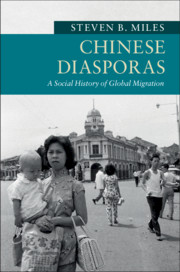Book contents
- Chinese Diasporas
- New Approaches to Asian History
- Chinese Diasporas
- Copyright page
- Dedication
- Contents
- Illustrations
- Acknowledgments
- Notes on Using This Book
- Introduction: Framing Chinese Migration
- 1 Early Modern Patterns, 1500–1740
- 2 Migration in the Prosperous Age, 1740–1840
- 3 The Age of Mass Migration, 1840–1937
- 4 The Chinese State and the Politics of Diaspora, 1860s–1940s
- 5 Disruptions and Diasporic Communities in the Mid-Twentieth Century
- 6 The “Floating Population” and “New Migrants,” 1980s to the Present
- 7 Transnational Chinese, 1990s to the Present
- 8 Is There a Chinese Diaspora?
- Index
- New Approaches to Asian History
- References
5 - Disruptions and Diasporic Communities in the Mid-Twentieth Century
Published online by Cambridge University Press: 31 January 2020
- Chinese Diasporas
- New Approaches to Asian History
- Chinese Diasporas
- Copyright page
- Dedication
- Contents
- Illustrations
- Acknowledgments
- Notes on Using This Book
- Introduction: Framing Chinese Migration
- 1 Early Modern Patterns, 1500–1740
- 2 Migration in the Prosperous Age, 1740–1840
- 3 The Age of Mass Migration, 1840–1937
- 4 The Chinese State and the Politics of Diaspora, 1860s–1940s
- 5 Disruptions and Diasporic Communities in the Mid-Twentieth Century
- 6 The “Floating Population” and “New Migrants,” 1980s to the Present
- 7 Transnational Chinese, 1990s to the Present
- 8 Is There a Chinese Diaspora?
- Index
- New Approaches to Asian History
- References
Summary
Chapter 5 explores emerging diasporic communities and their relationships to host societies. Through studies conducted by the sociologist Paul Siu and the historian Wang Gungwu, this chapter explores the ways in which Chinese scholars and writers explored these relationships. The chapter shows that one factor making explorations of these relationships so urgent was the obstacles that Chinese migrants faced in host societies, such as restrictions on immigration and other forms of anti-Chinese legislation. The chapter demonstrates that urgency also stemmed from disruptions to existing diasporic trajectories due to revolution in China and the onset of the Cold War. This chapter then introduces another example of an evolving diasporic community, Los Angeles, focusing in particular on a husband and wife who played prominent roles in shaping the city’s new Chinatown and in asserting the rights of Chinese Americans. The chapter then turns to “return” migration and “secondary” migration in the mid-twentieth century, as ethnic Chinese in Southeast Asia and elsewhere faced anti-Chinese violence and legislation.
Keywords
- Type
- Chapter
- Information
- Chinese DiasporasA Social History of Global Migration, pp. 168 - 195Publisher: Cambridge University PressPrint publication year: 2020



